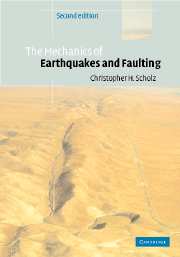Book contents
- Frontmatter
- Contents
- Preface to the first edition
- Preface to the second edition
- Acknowledgments
- List of symbols
- 1 Brittle fracture of rock
- 2 Rock friction
- 3 Mechanics of faulting
- 4 Mechanics of earthquakes
- 5 The seismic cycle
- 6 Seismotectonics
- 7 Earthquake prediction and hazard analysis
- References
- Index
- Plate section
7 - Earthquake prediction and hazard analysis
Published online by Cambridge University Press: 05 June 2012
- Frontmatter
- Contents
- Preface to the first edition
- Preface to the second edition
- Acknowledgments
- List of symbols
- 1 Brittle fracture of rock
- 2 Rock friction
- 3 Mechanics of faulting
- 4 Mechanics of earthquakes
- 5 The seismic cycle
- 6 Seismotectonics
- 7 Earthquake prediction and hazard analysis
- References
- Index
- Plate section
Summary
The most important social benefit from earthquake research is the use of that knowledge to reduce the hazard earthquakes pose to mankind. These applications may take several forms, which range from the construction of various kinds of hazard maps that permit the prediction (in a probabilistic sense) of the exposure to future ground shaking to the actual prediction of specific earthquakes. Here the current status of these developing fields is summarized.
Introduction
There was a time when the weather belonged to the gods.… There was a time when the earthquake was equally enveloped in mystery, and was forecast in the enigmatic phrases of the astrologer and oracle; and now that it too has passed from the shadow of the occult to the light of knowledge, the people of the civilized earth – the lay clients of the seismologist – would be glad to know whether the time has yet come for a scientific forecast of the impending tremor.
G.K. Gilbert (1909)Historical
Throughout the ages the prediction of earthquakes, along with wars, pestilences, famines, and floods, has been the occupation of soothsayers and other such self-proclaimed prophets. The skepticism that accompanied the rise of the scientific study of earthquakes has not, however, removed prediction as a serious goal. Lyell, for example, devoted considerable attention to the subject. He was impressed that throughout history, in many disconnected societies, nearly identical traditions could be found that held that earthquakes are preceded by unusual phenomena.
- Type
- Chapter
- Information
- The Mechanics of Earthquakes and Faulting , pp. 351 - 414Publisher: Cambridge University PressPrint publication year: 2002
- 1
- Cited by



